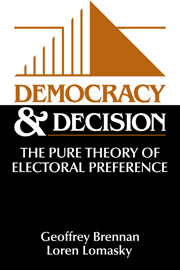Book contents
- Frontmatter
- Contents
- Preface
- 1 Ethics, politics, and public choice
- 2 The logic of electoral choice
- 3 The nature of expressive returns
- 4 The analytics of decisiveness
- 5 The theory of electoral outcomes: implications for public choice theory
- 6 From anecdote to analysis
- 7 Interpreting the numbers
- 8 Consensus, efficiency, and contractarian justification
- 9 Paternalism, self-paternalism, and the state
- 10 Toward a democratic morality
- 11 Constitutional implications
- Bibliography
- Index
6 - From anecdote to analysis
Published online by Cambridge University Press: 05 June 2012
- Frontmatter
- Contents
- Preface
- 1 Ethics, politics, and public choice
- 2 The logic of electoral choice
- 3 The nature of expressive returns
- 4 The analytics of decisiveness
- 5 The theory of electoral outcomes: implications for public choice theory
- 6 From anecdote to analysis
- 7 Interpreting the numbers
- 8 Consensus, efficiency, and contractarian justification
- 9 Paternalism, self-paternalism, and the state
- 10 Toward a democratic morality
- 11 Constitutional implications
- Bibliography
- Index
Summary
Economic theory must be more than a structure of tautologies if it is to be able to predict and not merely describe the consequences of action: if it is to be something different from disguised mathematics.
Milton Friedman, “The Methodology of Positive Economics”Introduction
In this chapter and the next, we consider directly the question of empirical warrant. Does the expressive theory of voting developed in the foregoing pages explain what we observe better than does the homo economicus alternative? Does it provide new hypotheses that the data do not reject? Does the alternative view of voting behavior it offers actually fit the facts?
These questions are not so easily answered, partly because the facts that have to be explained are various and are themselves theoretically constructed, partly because homo economicus is a very slippery customer, partly because the expressive theory may often enough map the self-interest account, and partly because it is not entirely clear what the expressive theory predicts. We do not, therefore, see ourselves as unveiling some single millennial event that will constitute final and definitive refutation of the standard interpretation of pseudorational actor political theory, or even some series of events that will conclusively establish the expressive account of voting as a preferred alternative. The picture of confirmation and rejection of theories as a swashbuckling drama of bold conjectures lance to lance with mortal refutations does not strike us as descriptive in fact or even worthy in aspiration.
- Type
- Chapter
- Information
- Democracy and DecisionThe Pure Theory of Electoral Preference, pp. 90 - 107Publisher: Cambridge University PressPrint publication year: 1993



